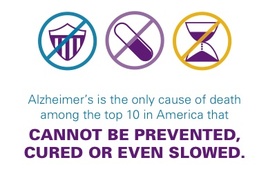
–George Washington Carver
[Information courtesy of www.alz.org]
In 2011, the baby boomer generation began turning age 65 at the rate of 10,000 per day spanning the subsequent 18 years. Of those Americans aged 65 or older, 1 in 9 has Alzheimer’s, and 1 in 3 Seniors 85 or older has the disease. Of the 5.2 million currently afflicted, two-thirds are women, and by 2050 these numbers will triple barring the development of medical breakthroughs to prevent, slow, or stop the disease.
Between 2000-2010, deaths from Alzheimer’s increased 68% while deaths from other major diseases decreased:
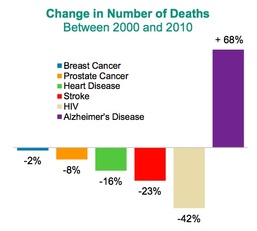
Why is this happening? Take a 3-minute look at biochemist, Gregory Petsko’s explanation of things. His graphs are staggering.
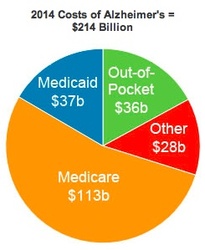
It has already affected you… “Right now, those and other neurologic diseases -- for which we have no cure or prevention -- cost about a third of a trillion dollars a year. It will be well over a trillion dollars by 2050.”
Alzheimer’s is a massive financial weight on our country.
Unless something is done, Alzheimer’s will cost an estimated $1.2 trillion (in today’s dollars) in 2050. Costs to Medicare and Medicaid will increase nearly 500 percent – if we can manage to maintain it at all.
In 2013, 15.5 million family/friends provided 17.7 billion hours of unpaid care to those with Alzheimer’s and other dementias – valued at $220.2 billion. Due to the physical and emotional toll of caregiving, Alzheimer’s and dementia caregivers had $9.3 billion in additional health care costs of their own in 2013. Currently, 1 in every 5 dollars of Medicare is spent on people with Alzheimer’s or other dementias.
Unless our priorities change, the epidemic will continue… Despite the recent approval of the Alzheimer’s Accountability Act by President Obama and Congress, which sets a national plan into place to prevent and treat Alzheimer’s by 2025, our funding continues to be misappropriated at the highest levels. Currently, for every $26,500 Medicare and Medicaid spent on caring for individuals with Alzheimer’s, the National Institutes of Health (NIH) spends only $100 on Alzheimer’s research (see chart below), and sadly, these numbers have not changed much since 2011. We know smart investments in scientific research pay big dividends, as demonstrated by the recent reductions in mortality rates (revisit first graph above) for conditions such as cancer, HIV/AIDS, cardiovascular disease, and diabetes. But...are people really getting the message?
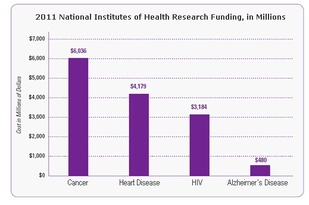
1. Get Educated: This disease is going to hit your family, so start learning the facts and call your local Alzheimer’s Association Chapter at 1-800-272-3900.
2. Get Involved: Participation is the key to promoting awareness! Spread knowledge through your advocacy or involvement in the Walk to End Alzheimer’s, The Longest Day, or other FUNdraising local chapter events.
3. Be Prepared: Whether it’s you or a loved one, you do not want to be in emergency mode asking the tough questions about Long-term care - How will I take care of my parents? How will this alter my well-being? My career? My family? Who will pay for all these expenses? Seek out quality sources for reference and read up on how to prepare for you and your parent’s future. Note: It is STRONGLY recommended you have a supplemental, private insurance plan in place as Medicare will not cover expenses associated with Long-term care (now averaging $5K/month). Social Security is no guarantee either, especially when medical costs are projected to exceed $10K/month within the next decade. Medicaid is essentially welfare, and with that, the sad reality of having no control over your care or whether you receive any at all, so start planning now! Here’s one resource I have used: http://www.amazon.com/Whats-Deal-Long-Term-Care-Padawer/dp/0985082070
4. Make a Donation: Recent reports brought several charities and organizations into the spotlight with excessive administrative overhead. Know that your donation and those you collect are going to the right place, and can be designated to benefit a specific area of support like research, care, awareness, or advocacy.

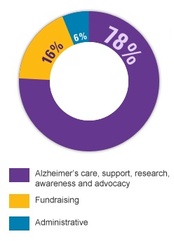

 RSS Feed
RSS Feed